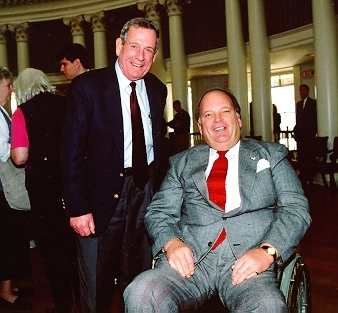|
|
|
|||||||



|
"Gov-elect Mark R. Warner told a University of Virginia conference Monday night that his administration will begin next month with a bipartisan emphasis on solving Virginia's budget problems. 'Our problems, particularly our budget problems, need common cause,' Warner said in an upbeat address to the fourth annual American Democracy Conference sponsored by UVa's Center for Governmental Studies. 'We have an opportunity at this point to really put Virginia first, to really put aside politics as usual,' Warner told a Rotunda Dome Room dinner audience in a speech that largely repeated thmes from his campaign. After his speech, Warner said that his Cabinet will include members of both major political parties, not just Democrats, although he would not get specific about whether elected Republican officials, such as state senators or Lt. Gov. John H. Hager would be asked to serve.
'Time will tell' about those individuals,' Warner said. 'There will be Republicans in our Cabinet.' Republicans meeting in Norfolk over the weekend said they have heard that a few GOP state senators and Hager could be asked to serve in Warner's Cabinet, with the lieutenant governor being considered for secretary of commerce and trade. Hager said only that 'I am still looking at options. I have not turned down anything yet. I'm excited about having opportunities to look at.' Warner told the dinner audience that his campaign made real efforts to reach out to rural voters and to Republicans as well as many other groups and communities with a 'focus on economic hope.' With black voters, 'We did as well as anyone in recent history,' the governor-elect said. 'If you are going to focus on economic hope in this changing world, you must focus on those issues and not the social issues,' Warner said. He said he ran a positive campaign based on new technology and prosperity messages and ignoring those 'still interested in fighting the old political battles, the label battles.' In a real political sense, Warner was making a virtue out of necessity by downplaying traditional Democratic appeals and social issues in a predominatly Republican state. He said his lack of such an emphasis 'opened me up for attacks from both sides.' 'My Republican friends said I was trying to make myself into something I wasn't,' Warner said. 'My Democratic friends complained I wasn't being orthodox.' Happy with the result, Warner said his tactics included 'a combination of both the old and the new' by winning campaign sign wars, particularly in rural areas, and having 'something as old-fashioned as a political song.' In addition to Warner, the conference heard from four panels of experts on the state of the presidency, the press and the political parties in the aftermath of the Sept. 11 terrorist attacks on America. The terrorist attacks did not significantly change the political races for governor in Virginia or New Jersey after all the candidates suspended campaigning for a few weeks, panelists agreed. 'The candidates were just as lousy with their commericals,' said Doug Bailey, a former GOP campaign consultant and founder of a free nonpartisan political Internet site. 'They went back to what they were doing before.' So far, politics has not been transformed by the extraordinary attack despite a potential for change, he said. 'I don't see anything going on in the Congress or the campaign world likely to make that happen.' Bailey blasted Congress for taking two months 'to produce an airport security bill that cannot be implemented. That is not leadership. That is politics as usual at a time it is not called for'. President Bush enjoys high popularity and performance ratings, but they are based more on patriotism than politics, and he appears unwilling to use his political capital while prosecuting a war, Bailey said. All presidents have high initial wartime support, said UVa government professor Sidney Milkis. 'People in the White House are very conscious of what happened to his father,' who lost similar high ratings quickly after the Gulf War a decade ago. 'Politically, President Bush is struggling to strike a balance between being the leader of the country and the leader of the Republican Party,' Milkis said. 'The war has made striking that balance all the more difficult for him.' Milkis said Bush is invoking the legacy of President Harding. He said Bush is calling for normalcy at the same time he is leading the nation in a war, making for an awkward 'call to duty and a call to go to the mall and spend some money' to fight a recession. Prosecuting the war past Afghanistan and into other nations is likely only to get harder, Milkis said. It's very hard to pinpoint who the real enemy is, and 'the war on terrorism has no clear end and no clear boundary,' he said. Keeping an international coalition together will only get more difficult after Afghanistan. Yet the Bush presidency 'has now found its mission and its moment in history' and is not likely to drop the war on terrorism, he said. 'On the political front, the president has run away from politics,' said Time magazine White House correspondent John Dickerson. 'He stayed out of the last election cycle' in New Jersey and Virginia. 'Great presidents have been able to transform their parties. He has not
remade the [Republican] party,' Dickerson said. 'He wants to seem non-partisan'"
(Bob Gibson, The Daily Progress, December 4, 2001).
|

